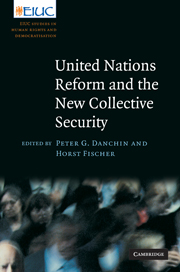Book contents
- Frontmatter
- Contents
- List of contributors
- Series editors' preface
- Preface
- List of abbreviations
- Introduction: the new collective security
- PART I Law and politics in United Nations reform
- 1 Things fall apart: the concept of collective security in international law
- 2 Reflections on the politics of institutional reform
- 3 Great Powers then and now: Security Council reform and responses to threats to peace and security
- PART II Defining “threats” to collective security
- PART III Prevention and responses
- PART IV Perspectives on the ground
- Bibliography
- Index
1 - Things fall apart: the concept of collective security in international law
from PART I - Law and politics in United Nations reform
Published online by Cambridge University Press: 05 May 2010
- Frontmatter
- Contents
- List of contributors
- Series editors' preface
- Preface
- List of abbreviations
- Introduction: the new collective security
- PART I Law and politics in United Nations reform
- 1 Things fall apart: the concept of collective security in international law
- 2 Reflections on the politics of institutional reform
- 3 Great Powers then and now: Security Council reform and responses to threats to peace and security
- PART II Defining “threats” to collective security
- PART III Prevention and responses
- PART IV Perspectives on the ground
- Bibliography
- Index
Summary
Turning and turning in the widening gyre
The falcon cannot hear the falconer;
Things fall apart; the centre cannot hold;
Mere anarchy is loosed upon the world.
W. B. Yeats, “The Second Coming” (1920)Introduction
In June 1919, a year before Yeats penned his sorrowful lament to the collapse of European order and Christian civilization in the First World War, Article 16 of the Covenant of the League of Nations came into force. Article 16 encapsulated the theory implicit in the Covenant and the Pact of Paris that war is illegitimate as an instrument of policy or of justice, or indeed for any purpose, except individual or collective defense against a state which has already resorted to or is immediately threatening war. It provided, in part, as follows:
Should any Member of the League resort to war in disregard of its covenants … it shall ipso facto be deemed to have committed an act of war against all other Members of the League, which hereby undertake immediately to subject it to the severance of all trade or financial relations, the prohibition of all intercourse between their nationals and the nationals of the covenant-breaking State, and the prevention of all financial, commercial or personal intercourse between the nationals of the covenant-breaking State and the nationals of any other State, whether a member of the League or not.
It shall be the duty of the Council in such case to recommend to the several Governments concerned what effective military, naval or air force the Members of the League shall severally contribute to the armed forces to be used to protect the covenants of the League.
- Type
- Chapter
- Information
- United Nations Reform and the New Collective Security , pp. 35 - 75Publisher: Cambridge University PressPrint publication year: 2010
- 2
- Cited by



